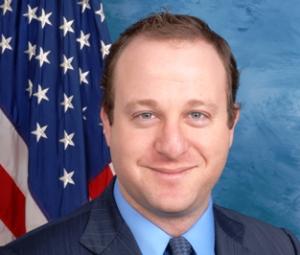California's medical marijuana dispensary numbers are shrinking under a two-pronged local and federal attack, leaving patients in the lurch. Advocates want more of a fightback.
An amendment to allow limited hemp production passed the House, but the Farm Bill it was attached to was surprisingly defeated. On the upside, that also killed an amendment that would have let states drug test food stamp recipients.
An Oregon bill that would create a state-registered system of medical marijuana outlets has passed the House and now moves to the state Senate.
The US Conference of Mayors, representing the chief elected official in cities over 30,000, has come out strongly and unanimously to call for the feds to take a hands off approach to medical marijuana and marijuana legalization in the states.
It's been a good week for medical marijuana in state legislatures, with New Hampshire now poised to become the 19th medical marijuana state, and that's just for starters. Meanwhile, the war of attrition against California dispensaries continues.
A Wisconsin cop and a Washington cop face justice for their pervy behavior, and a New Mexico jail guard and a Georgia cop get in trouble over marijuana.
An undercover drug sting in a Charlotte school parking lot ended with an informant wounded and a marijuana seller dead, and local residents questioning police decisions.
A Bronx man is dead after swallowing a bag of cocaine while struggling with police trying to arrest him. That's 16 drug war deaths so far this year.
StoptheDrugWar.org needs your support to continue our work during the most important time in drug reform we've ever seen. We have gifts to send you too, with donations of $15 or more.
Interns are making an important difference fighting the good fight with us at StoptheDrugWar.org.
California medical marijuana dispensaries -- and their patients -- are under a sustained, two-pronged attack, and that is having a dramatic impact on patient access across the state. Under pressure from the federal government on one hand and newly-emboldened local officials on the other, dispensary numbers are shrinking and ever larger swathes of the state that legalized medical marijuana nearly 17 years ago are without anywhere to get medical marijuana.
Anyone who is following the situation in the Golden State at all closely has seen a numbing litany of reports of dispensaries forced out of business, including from some of the most venerable, respected, and law-abiding operations in the state. What had been the occasional raid or prosecution by the DEA or federal prosecutors during the early years of the Obama administration has turned into a heightened onslaught since the issuance of the notorious
Cole memo, written by Assistant Attorney General James Cole, two years ago next week and the announcement by California's four US Attorneys that fall that they were declaring open season on dispensaries.
And while recalcitrant city and county law enforcement and elected officials had managed to make access to medical marijuana a patchwork affair across the state through moratoria and bans, pressure from local officials has only escalated since the state Supreme Court's decision in City of Riverside v. Inland Empire Patients Health and Wellness Center early last month. In that case, the court ruled unanimously that localities could indeed use their zoning powers to ban dispensaries, not just regulate them. Since that ruling, localities that had hesitated to impose or enforce existing bans have responded with alacrity.
Reading the writing on the wall, Inland Empire closed its doors the day after the ruling. In other places, officials weren't waiting for dispensaries to shut down -- they were ordering them to. In May, Stockton took its first steps toward a dispensary ban, San Bernardino bragged that it had shut down 18 dispensaries and was working to close the remaining 15, Palm Springs was working to shut down five, a Thousand Palms dispensary closed its doors with the owner saying he didn't want Riverside County deputies to do it for him, Garden Grove ordered all 62 dispensaries there to shut down or face prosecution (and reported days later that they had), Los Angeles voted to shrink its number of dispensaries from 500 or more to 135, and Anaheim ordered its last 11 dispensaries (down from 143 in 2007) to close.
The big chill continued this month, with Bakersfield moving to ban dispensaries, Riverside County threatening to arrest the owner of one of its three remaining dispensaries (down from 77 in 2009) until he closed his doors, and Santa Ana reporting it had shut down 42 dispensaries (bringing the total closed there to 109) and was siccing the DEA on the remaining 17.
"We think the Inland Empire decision just maintains the status quo -- more than 200 local governments had banned distribution outright in their jurisdictions -- but now, you're seeing local government wielding a bigger stick to shut down dispensaries operating in defiance of existing bans," said Kris Hermes, communications director for Americans for Safe Access (ASA)."Anaheim, San Bernardino, Long Beach, Riverside, mostly in Southern California, where dispensaries were flouting those bans, they are now being forced to shut down."
"Cities that weren't moving forward are now," said Lanny Swerdlow, founder of Inland Empire and member of the Patient Advocacy Network. "A number of cities in Riverside have been closing collectives real fast, with San Bernardino being the most aggressive at the present time. Palm Springs is the only city in the Inland Empire that actually has zoning for collectives, and they have three operating there. The county is moving more slowly -- most collectives have not even been served notices yet -- but it's just a matter of time," he predicted.

Steve DeAngelo and his Harborside Health Center are still open for business, but under federal assault (ssdp.org)
Meanwhile, according to ASA, federal prosecutors have sent out more than 600 "threat letters" since their offensive began, including 103 sent to Los Angeles dispensaries earlier this month. The letters warn either dispensary operators or landlords or both with asset forfeiture and/or criminal prosecution, with the threat of lengthy federal prison sentences hanging over their heads. Not surprisingly, they have been quite effective.
"Before the 103 letters sent out this month, we estimated that about 500 letters had been sent out and about as many closures had occurred as a result of the US Attorneys' efforts to threaten dispensary operators and landlords, said Hermes. "With the combined momentum of the federal attacks and the state Supreme Court decision, I think we've seen more than 700 dispensaries shut down over the past couple of years."
Some of the iconic operations that helped define the dispensary movement are gone, such as the Marin Alliance for Medical Marijuana, scared out of business by federal threats, or Richard Lee's Coffee Shop Blue Sky, shuttered by DEA raiders. Others like San Francisco's Shambala are under attack, while it seems that only the biggest players, such as the Berkeley Patients Group and Harborside Health Care Centers in Oakland and San Jose, have the wherewithal to fight the feds in court. Those latter dispensaries are both contesting federal asset forfeiture actions right now.
Sometimes it's the federal government; sometimes it is recalcitrant local officials. Sometimes, the two work hand in hand.
"The city of Riverside sent letters to the Justice Department requesting they come in and close collectives down, and they've gone to a couple in San Bernardino and closed them down, too," said Swerdlow.
Many dispensaries remain open for business -- ASA's Hermes estimated their number at a thousand or more -- some because local authorities have embraced them instead of trying to run them out on a rail, others because the US Attorneys simply don't have the resources to devote all their time to shutting them down. But the unquestioned reduction in dispensaries numbers, perhaps a decline of as much as 40% over the past couple of years, means that patients are having a more difficult time getting access to their medicine.
"We've been hearing from patients about access problems," said Ellen Komp, deputy director for California NORML, who added that it's not just dispensaries. "More and more places are passing cultivation ordinances, people are having their gardens torn up or being visited by code enforcement. We're reeling from it," she said.
"Patients should not have to drive hundreds of miles to get their medicine, and the tragedy of it is that there are still dozens of localities that have regulatory ordinances that are functioning quite well," said Hermes. "Those facilities are not going away unless they are shut down by the federal government, which has usually stayed away from those places. There is a community of dispensaries across the state, but the access is haphazard."
And there are broad areas of the state with no effective access.

Sorry, Riverside patients. This menu is now null and void. (norml.org)
"It is unacceptable that dispensaries are located only where local governments are tolerant enough to allow them," said Hermes. "The entire county of San Diego has been rid of dispensaries because of intolerance at the local and federal level. The entire Central Valley is virtually devoid of dispensaries, so is almost all the San Francisco peninsula from San Mateo down. Sacramento County is devoid of dispensaries thanks to the federal crackdown."
"What's going on now is absolutely horrid," said Swerdlow. "The only people benefiting from this are the criminals and the police. Patients are having to drive hundreds of miles to cities with collectives, or get their medicine the old-fashioned way, on the black market."
To change the situation is going to require battling at the state, local, and federal level. One immediate response has been an explosion of medical marijuana delivery services, but one immediate reaction has been to move to ban them, too, as Riverside County is considering.
"We've been getting lots of inquiries about starting delivery services," said CANORML's Komp.
Another, ongoing, response is to attempt to pass statewide legislation to regulate dispensaries. That effort in Sacramento is dead for this year, but could be revived next year.
Another possible response is a statewide initiative that would regulate and emphatically legalize dispensaries, but no one is ready to go on the record about that yet.
Ultimately, it's about getting the federal government off California's back. While bills have been filed in Congress, no one is holding their breath on that score. And the Obama administration appears content to maintain its status quo war of attrition.
If the California dispensary industry wants to survive and thrive, it might want to look in the mirror -- part of the problem for California dispensaries, said Swerdlow, was the industry's failure to organize effectively.
"If the DEA sent out letters to gun stores saying they were going to shut them down, there would be a couple of thousand people demonstrating," he argued. "We've done a piss poor job of doing the things that need to be done to protect our rights. Money-grubbing collective owners never formed any useful or meaningful trade associations to protect their rights. Those jerks got what was coming to them," he said bitterly.
If dispensary operators were short-sighted, Swerdlow said, patients have not been much better, despite the efforts of groups like ASA and CANORML to organize them.
"Most patients don't do anything," he said. "They just want to get the marijuana."
Protecting patients and collectives requires effective political action at the local level, Swerdlow said. He has pioneered -- for the medical marijuana movement, at least -- the creation of groups within the Democratic Party to press the party at the local level, known as Brownie Mary Clubs.
"We were the first medical marijuana affinity group ever chartered here, and we've made progress here. We're working for political candidates, and I was a delegate to the state Democratic convention. That's the kind of thing that can make a difference," he said.
But medical marijuana advocates need to understand that this isn't everybody's issue, even if others are sympathetic.
"Everyone is sympathetic, most Democrats get it, at least all the ones I meet," he explained, "but this isn't their issue. They're about health care or the environment or schools. They will support us, but we have to be there to get that support."
There is work to be done to protect patient access to medical marijuana in California. There are various options. It is up to medical marijuana patients and dispensary operators, as well as those ancillary businesses profiting from them, to more effectively take up the cudgel.
But it is ultimately a fight for federal recognition of medical marijuana, or at least, of states' rights to experiment with marijuana policy. That's not just up to California patients and dispensary operators, but all of us.
[For extensive information about the medical marijuana debate, presented in a neutral format, visit MedicalMarijuana.ProCon.org.]
back to top
The Farm Bill (House Bill 1947) died in the House Thursday morning as Democrats rebelled against deep cuts to food stamps. The vote to kill it came after the House had approved separate amendments that would have allowed for limited hemp production, but also would have allowed states to require drug tests for food stamp applicants.

Rep. Jared Polis (D-CO) saw his hemp amendment pass the House, only to die along with the farm bill. (wikimedia.org)
In an historic first, the House passed an amendment offered by Reps. Jared
Polis (D-CO), Earl
Blumenauer (D-OR), and Thomas
Massie (R-KY) that would allow hemp to be grown for research purposes. The amendment passed 225-200, despite a last-minute lobbying blitz against it from the DEA, complete with
a DEA talking points memo obtained by the Huffington Post.
Still, despite the DEA's concerns that allowing limited hemp production for research would make law enforcement's job more difficult, a majority of lawmakers weren't buying, and amendment sponsors and hemp advocates pronounced themselves well-pleased.
"Industrial hemp is an important agricultural commodity, not a drug," said Rep. Polis. "My bipartisan, common-sense amendment would allow colleges and universities to grow and cultivate industrial hemp for academic and agricultural research purposes in states where industrial hemp growth and cultivation is already legal. Many states, including Colorado, have demonstrated that they are fully capable of regulating industrial hemp. The federal government should clarify that states should have the ability to regulate academic and agriculture research of industrial hemp without fear of federal interference. Hemp is not marijuana, and at the very least, we should allow our universities -- the greatest in the world -- to research the potential benefits and downsides of this important agricultural commodity."
"Industrial hemp is used for hundreds of products including paper, clothing, rope, and can be converted into renewable bio-fuels more efficiently than corn or switch grass," said Rep. Massie. "It's our goal that the research this amendment enables would further broadcast the economic benefits of the sustainable and job-creating crop."
"Because of outdated federal drug laws, our farmers can't grow industrial hemp and take advantage of a more than $300 million dollar market. We rely solely on imports to sustain consumer demand. It makes no sense," said Blumenauer. "Our fear of industrial hemp is misplaced -- it is not a drug. By allowing colleges and universities to cultivate hemp for research, Congress sends a signal that we are ready to examine hemp in a different and more appropriate context."
Nineteen states have passed pro-industrial hemp legislation. The following nine states have removed barriers to its production: Colorado, Kentucky, Maine, Montana, North Dakota, Oregon, Vermont, Washington and West Virginia.
"Vote Hemp applauds this new bipartisan amendment and we are mobilizing all the support we can. This brilliant initiative would allow colleges and universities the opportunity to grow and cultivate hemp for academic and agricultural research purposes," said Eric Steenstra, president of Vote Hemp. "It would only apply to states where industrial hemp growth and cultivation is already legal in order for those states to showcase just how much industrial hemp could benefit the environment and economy in those regions," continues Steenstra.
"Federal law has denied American farmers the opportunity to cultivate industrial hemp and reap the economic rewards from this versatile crop for far too long," said Grant Smith, policy manager with the Drug Policy Alliance. "Congress should lift the prohibition on the domestic cultivation of industrial hemp as soon as possible. Allowing academic research is an important first step towards returning industrial hemp cultivation to American farms."
Drug reformers' and hemp advocates' elation over passage of the hemp amendment was short-lived however, as the Farm Bill went down to defeat for reasons not having anything to do with hemp. But the upside to the bill's defeat was that it also killed a successful Republican-backed amendment that would have allowed states to drug test people applying for food stamps, now known officially as the Supplemental Nutritional Assistance Program (SNAP).
"If adopted, this amendment would join a list of good-government reforms contained in the farm bill to save taxpayer money and ensure integrity and accountability within our nutrition system," said its sponsor, Rep. Richard Hudson (R-NC), who added that it would ensure that food stamps go only to needy families and children.
But House Democrats were infuriated by the amendment. Rep. Gwen Moore (D-WI), said there was no evidence people on food stamps were any more likely to use drugs than anyone else and that the measure was meant only to embarrass and humiliate people on food stamps.
"It costs a lot of public money just to humiliate people," she said. "It'll cost $75 for one of these drug tests, and for what purpose? Just to criminalize and humiliate poor people."
"This is about demeaning poor people," added Rep. James McGovern (D-MA). "And we've been doing this time and time again on this House floor."
The food stamp drug testing amendment was just part of an overall House Republican assault on the food stamp program that would have cut it by more than $20 billion. It was that attack on food stamps that led Democrats to walk away from the bill. [Ed: Perhaps not just over the cuts -- a National Journal article reports the drug testing amendment cost it votes too.]
back to top
A bill that would create a registry of medical marijuana outlets and help legitimate the state's thriving medical marijuana industry passed a major hurdle Monday, winning approval in the House. The bill, House Bill 3460, now goes to the state Senate.
The bill passed the House 31 to 27 on a near party-line vote. All Republicans opposed it, and all Democrats but two supported it.
The Oregon Medical Marijuana Act (OMMA) allows patients to grow their own medicine or have someone else to it for them. But many patients have complained that they can grow marijuana themselves, can't find a reliable grower, and have to either do without or resort to the black market.
In the past few years, dispensaries have opened up to serve patient needs, but they have operated in a grey area since the OMMA did not specifically provide for them. That has led to differences in access to medical marijuana based on the attitudes of local officials.
In Multnomah County (Portland), for example, medical marijuana outlets have been largely tolerated, but providers have been raided in less tolerant areas of the state, and operators are now facing prosecution in Jackson, Lane, Washington, and Malheur counties.
Under the bill, which has been endorsed by state Attorney General Ellen Rosenblum, dispensary operators would have to pass criminal background checks, log the amount of marijuana coming into their businesses, and verify that it is being grown by state-registered growers. All approved dispensaries would go on a statewide registry.
"This bill focuses on one thing: safe access to medical marijuana for people legally qualified to have medical marijuana," said bill sponsor Rep. Peter Buckley (D-Ashland).
Some Republican members who voted against the bill complained that it did not address diversion allegedly occurring under the OMMA, but supporters said it was designed for a limited purposes.
"This bill does not straighten out all the problems in the medical marijuana program," said Rep. Mitch Greenlick (D-Portland). "What this bill does is regulate dispensaries so people with a legitimate need for medicine can get easy, safe, proper access to that drug."
[For extensive information about the medical marijuana debate, presented in a neutral format, visit MedicalMarijuana.ProCon.org.]
back to top
The United States Conference of Mayors Monday unanimously passed a resolution criticizing the failures of marijuana prohibition and urging the federal government to respect the ability of states and localities to implement medical marijuana and marijuana legalization measures without further interference.
The US Conference of Mayors is the official, nonpartisan organization for mayors of cities with a population of 30,000 or more. There are 1,302 cities that qualify, and each is represented at the Conference by its chief elected official, the mayor.
"In November, voters in my city and state strongly approved a ballot measure to legalize, tax and regulate marijuana," said Aurora, Colorado, Mayor Steve Hogan. "The bipartisan resolution we passed today simply asks the federal government to give us time to implement these new policies properly and without interference. Cities and states across the country are enacting forward-thinking reforms to failed marijuana prohibition policies, and for the federal government to stand in the way is wasteful and contrary to the wishes of the American people."
The resolution notes that "enforcing the costly and ineffective prohibition on marijuana drains limited resources that could be better spent on programs that more effectively serve the public and keep our cities safe from serious and violent crime" and demands that "federal laws, including the Controlled Substances Act, should be amended to explicitly allow states to set their own marijuana policies without federal interference" so that localities can "set whatever marijuana policies work best to improve the public safety and health of their communities." Until federal laws are amended, the Conference "urges the President of the United States to reexamine the priorities of federal agencies to prevent the expenditure of resources on actions that undermine the duly enacted marijuana laws of states."
The resolution was cosponsored by 18 mayors, including Bob Filner of San Diego, Mike McGinn of Seattle, Carolyn Goodman of Las Vegas, Jean Quan of Oakland (California), Steve Hogan of Aurora, Colorado; Marilyn Strickland of Tacoma, Washington; Kitty Piercy of Eugene Oregon; and William Euille of Alexandria, Virginia; among several others.
"The prohibition on marijuana has been ineffective and counterproductive," said Mayor Stephen Cassidy of San Leandro, California. "Voters in states and cities that wish to break the stranglehold of organized crime over the distribution and sale of marijuana in their communities by legalizing, regulating and taxing marijuana should have the option of doing so."
"I'm not going to be using Justice Department resources to try to circumvent state laws on this issue," Barack Obama pledged as he sought the Democratic Party nomination in 2008. But his administration has shuttered more state-legal medical marijuana providers in one term than were closed by federal authorities during the two terms of George W. Bush's presidency.
And in the wake of November's strong passage of initiatives to legalize and regulate marijuana for all adults by voters in Colorado and Washington, Attorney General Eric Holder has repeatedly said that the administration's response is coming "relatively soon."
"It's time for President Obama to enact the changes he promised during the 2008 campaign," said Tom Angell, chairman of Marijuana Majority, the organization that led the effort to pass the resolution, generating nearly 7,000 constituent letters to almost 1,000 mayors across the country. "A strong and growing majority of Americans want states to be able to set their own marijuana laws without federal harassment. Local officials are enacting policies that serve to protect the health and safety of their communities better than the failed policy of prohibition has, and they deserve the respect they are asking for from the Obama administration."
"The prohibition on marijuana has been ineffective and counterproductive," said Mayor Stephen Cassidy of San Leandro, California. "Voters in states and cities that wish to break the stranglehold of organized crime over the distribution and sale of marijuana in their communities by legalizing, regulating and taxing marijuana should have the option of doing so."
"We commend the US Conference of Mayors for taking action in defense of state and local efforts to move beyond the failed policy of marijuana prohibition. Our nation's marijuana policy should reflect the facts about marijuana. If our federal government is unwilling to adopt evidence-based marijuana laws, it is up to states and localities to pick up the slack," said Mason Tvert, lead proponent for the successful Colorado legalization initiative and now director of communications for the Marijuana Policy Project.
"Voters around the nation are increasingly becoming fed up with laws that deny seriously ill people the right to use medical marijuana and punish adults simply for using a substance that is objectively less harmful than alcohol. It is time to end marijuana prohibition and replace it with a more sensible approach," Tvert added.
back to top
It's been a good week for medical marijuana in state legislatures, with New Hampshire now poised to become the 19th medical marijuana state, and that's just for starters. Meanwhile, the war of attrition against California dispensaries continues. Let's get to it:
NationalOn Monday, the US Conference of Mayors urged the federal government to butt out when it comes to states that have embraced medical marijuana or marijuana legalization. In a resolution that passed without a single dissenting vote, the group representing the mayors of cities of 30,000 or more said they stood"in support of states setting their own marijuana policies without federal interference."
California
Last Thursday, the city of Oakland asked a federal judge to stay asset forfeiture proceedings against Harborside Health Center, the nation's largest medical marijuana dispensary. Oakland sued the government in 2012 for abandoning its alleged promises not to interfere with a state's plan to regulate medical marijuana shops. Federal prosecutors argued that Oakland didn't have standing to sue, and US Magistrate Elena James had agreed, dismissing the case. But the city asked for the proceedings to be stayed while it appeals to the US 9th Circuit Court of Appeals. Attorneys for Harborside and Concourse Business Center, which owns the property where the San Jose club is located, also urged the court to also stay proceedings in the forfeiture case against Harborside's San Jose location.
On Monday, a Shasta County judge ordered Redding's dispensaries to close their doors by July 1. That ended a protracted legal battle that began when the city banned dispensaries in 2011. Last month, the state Supreme Court upheld localities' right to ban them. There are least nine dispensaries in the city.
On Tuesday, state and federal narcs held a training course in Alameda County to teach Northern California law enforcement personnel the most effective means of going after dispensaries, growers, and patients. Sponsored by the California Narcotics Officers Association and the Office of National Drug Control Policy, "Storefront Marijuana Sales and Cultivation Investigations" promised to reveal techniques like those employed by the LAPD and "has developed a successful method to conduct Marijuana Store investigations and successfully shut them down." In the division of one featured LAPD instructor, "there were 68 stores, now there are none!," the CNOA bragged. [Ed: CNOA does not believe in medical marijuana.]
Hawaii
On Tuesday, Gov. Neal Abercrombie signed into law two medical marijuana bills. House Bill 668 effectively authorizes the transfer of the medical marijuana program from the Department of Public Safety to the Department of Health and establishes a Medical Marijuana Registry special fund. Senate Bill 642, amends the definitions of "adequate supply", "medical use", "primary caregiver", "usable marijuana", and "written certification." The measure allows the medical use of marijuana if the amount of marijuana possessed by the qualifying patient does not exceed an "adequate supply." The bill also amends registration requirements and allows inquiries by law enforcement agencies regarding registration status to be made 24 hours a day, 7 days a week. The measures were supported by medical marijuana advocates and take effect in January 2015.
Maine
On Tuesday, a bill adding PTSD to the list of treatable conditions for medical marijuana became law without the governor's signature. The passage of LD 1062 makes Maine the second state this month to add the disorder to the list of ailments that can be treated with medical marijuana. Oregon did so just weeks ago.
Michigan
Last Friday, Google made a large in-kind grant to a medical marijuana advocacy group. Michigan Compassion, a nonprofit organization, won $250,000 in annual credits for AdWords, Google's main advertising offering for business and related services. The grant continues for the life of the organization, meaning it could eventually be valued at millions of dollars. The group will use the grant to increase its Internet presence.
On Tuesday, a man who grew 8,000 plants for the medical market was sentenced to probation. Edwin Schmieding, 61, who suffers from throat cancer, caught a break because of numerous hand-written letters from supporters, US District Judge Bernard Friedman said. Federal prosecutors didn't object to the downward departure from sentencing guidelines, which would have mandated a lengthy mandatory minimum sentence, but they still want to seize his farm.
Nevada
Last Wednesday, the Reno city council debated whether to allow dispensaries in the city, Nevada's second largest. A bill allowing dispensaries in the state was signed into law earlier this month. It allows for up to 10 dispensaries in Washoe County, where Reno is located, but only two within the city itself. The council agreed that if they did decide to go ahead and allow the dispensaries, they were going to need to determine who would be licensed, whether to charge application fees and what locations could be used for the dispensaries. The council decided to work out regulation issues in a meeting in September so they would have more information available to make their decision.
New Hampshire
On Wednesday, the New Hampshire legislature gave final approval to a medical marijuana bill. Gov. Maggie Hassan (D) has said she will sign it. That would make New Hampshire the 19th medical marijuana state, along with the District of Columbia. A medical marijuana bill is also awaiting the governor's signature in Illinois. House Bill 573, sponsored by State Rep. Donna Schlachman (D-Exeter), will allow residents with certain debilitating illnesses, such as cancer, multiple sclerosis, and HIV/AIDS, to possess up to two ounces of medical marijuana if their doctors recommend it. Patients will be able to obtain medical marijuana through one of four nonprofit, state-licensed alternative treatment centers, but will not be able to grow their own under the compromise crafted to meet the concerns of the governor and law enforcement.
New Jersey
On Monday, the Assembly passed a bill that would make it easier for children to use medical marijuana. The measure has already passed the state Senate and now awaits a signature from Gov. Chris Christie (R). The parents who pushed for the bill tried to see the governor after the vote, but were not granted a meeting with him. The vote was 55-13, with nine abstentions. The bill would require minors to get consent from only one doctor instead of three -- the same as adults -- and would allow marijuana to be sold in edible form.
Oregon
On Monday, a bill that would set up a system of state-regulated dispensaries passed the House. House Bill 3460 now heads for the state Senate.
Vermont
On Sunday, the state's first dispensary opened for business in Burlington. The following day, the state's second dispensary opened in Montpelier. The dispensaries open nearly two years after the legislature okayed them and nine months after winning state approval. A third is set to open soon in Brandon.
[For extensive information about the medical marijuana debate, presented in a neutral format, visit MedicalMarijuana.ProCon.org.]
back to top
A Wisconsin cop and a Washington cop face justice for their pervy behavior, and a New Mexico jail guard and a Georgia cop get in trouble over marijuana. Let's get to it:
In Macon, Georgia,
a Macon police officer was arrested last Thursday on drug and child endangerment charges. Officer
Kontrina Lanette Toomer was arrested after a raid of her home turned up 11 ounces of marijuana packaged for sale. She is charged with possession of marijuana with intent to distribute and child endangerment. Internal affairs officers took her gun and badge. The child endangerment charge appears to be merely because children were present in her home when marijuana was present.
In Clovis, New Mexico, a Curry County jail guard was arrested last Tuesday on charges she tried to smuggle marijuana into the jail. Erin Shields, 22, allegedly communicated with an inmate her willingness to bring in contraband and arranged for a third party to place it in her vehicle. She was carrying marijuana and tobacco on her when she was stopped and searched by sheriff's detectives as she arrived for work at the jail. She is charged with distribution of marijuana and bringing contraband into a place of imprisonment. Both are fourth-degree felonies. She is now a former Curry County jail guard.
In Auburn, Washington, a former Auburn police officer pleaded guilty Monday to fondling a woman he had pulled over for a traffic violation and then accused of smoking marijuana. John Michael Clemmons, 50, went down for a January 2012 incident in which he pulled over a 24-year-old woman who had pulled out of a bar parking lot. After following her to her home, where she parked her car, he had her take a field sobriety test, which she passed. Clemmons handcuffed the woman in the back of his patrol car and told her she could be taken to jail, that he smelled marijuana, and that he needed to search her. The woman said that while she was still handcuffed, he felt underneath her bra and clothing below her waist. She said he also used his flashlight to look inside her pants. Clemmons then asked for her phone number and if he could enter her residence, then grabbed her buttocks when she said no. The woman told him she felt that he may be trying to arrest her for prostitution or offering a sexual act, but he replied that he wouldn't arrest her for that and said he was off duty. (Court records and a police statement make clear he was on duty and in uniform.) Clemmons did not record the stop or notify dispatch. He pleaded guilty to fourth-degree assault and was sentenced to 80 hours of community service and two years deferred adjudication.
In Milwaukee, Wisconsin, a former Milwaukee police officer was sentenced last Wednesday to two years in prison for performing illegal strip searches and body cavity searches on dozens of drug and other suspects. Michael Vagnini had pleaded no contest in April to four felonies and four misdemeanors. Prosecutors said Vagnini conducted searches inside men's underwear, sometimes inserting his finger in their rectums. Body cavity searches by police are prohibited by state law. Although Vagnini pleaded guilty weeks ago, he remained suspended with pay until he resigned at sentencing. Three other officers were charged with Vagnini. They were also suspended with pay pending trials later this year.
back to top
An undercover drug sting in the parking lot of a Charlotte, North Carolina, elementary school ended up with one person killed and one person wounded, and a community wondering why police chose that particular location for their operation. Jaquaz Walker, 17, becomes the 17th person to die in US domestic drug law enforcement operations so far this year.
According to reports from
WSOC-TV and
WBTV 3, police set up a marijuana buy between an undercover police officer, an informant, and two teenagers last Tuesday afternoon. Police said that during the drug deal, Walker pulled a gun and shot the informant in the shoulder in an attempt to rob him.
The undercover police officer then shot Walker in the head, killing him. The teen who accompanied Walker fled, but was arrested later.
"You know, you have 15, 16 year old kids out here wielding firearms, that's a very dangerous situation," said Charlotte-Mecklenburg Police Chief Rodney Monroe, who also defended the decision to do the deal in an elementary school parking lot. "Anytime you conduct an undercover operation, what's a good location? Whether it's a shopping mall or neighborhood, there is no real perfect location."
Monroe also said that school was out and that the site was chosen by Walker and his companion. "This was a location identified by individuals that we were seeking to purchase drugs from," he said. "We were aware that the school was empty of kids."
But residents of the neighborhood where the shooting took place were not mollified.
"It bothers me that I live right across from the school, and it is bad that it was on school grounds," said neighbor Wilmer Bourne. "That's what bothers me so much."
"It's been quiet in this neighborhood, ain't nothing happened over here, everything been good, it's always somebody come in the neighborhood and do this, it ain't nobody in our neighborhood," said resident Johnny Crank.
back to top
A New York City man apparently choked to death on a bag of cocaine as he struggled with police officers Wednesday night. Jose Muniz, 52, becomes the 16th person to die in US domestic drug law enforcement operations so far this year.
According to the
New York Daily News, citing police sources, officers spotted
Muniz conducting a drug deal, and
Muniz took off, ducking into a nearby bodega and attempting to swallow a bag of cocaine.
"We believe (Muniz) took a golf ball-sized packet of cocaine and put it into his mouth," said NYPD Commissioner Raymond Kelly. "There was a struggle. When you look at the video, there were no blows struck. There was wrestling, if you will, and also pepper spray was used."
Police said they pepper-sprayed Muniz during the struggle, and he began choking and having difficulty breathing. Police and an EMS crew attempted to revive him at the scene, then the EMS crew took off with Muniz in an ambulance, where they pulled the bag of cocaine from his throat. It was too late; Muniz was pronounced dead upon arrival at North Central Bronx Hospital.
Police were quick to release Muniz' arrest record, which included 23 arrests, mostly for drugs, but also for burglary and grand larceny. He also had nine sealed arrests, mostly for drugs.
NYPD Internal Affairs will investigate the death.
back to top
Dear friend,
StoptheDrugWar.org needs your help to continue our programs -- like this newsletter,
Drug War Chronicle -- during this most important time in the cause there has ever been.
Click here for some examples of how activists around the world rely on
Drug War Chronicle in their work.
As our thanks for your support, we continue our full set of membership offers, some of them available with donations of $15 or greater to our organization. We also continue to offer, with donations of $35 or more, "
Marijuana Legalization: What Everyone Needs to Know," authors of which were
recently hired to consult with the state of Washington on implementing legalization there.
The newest item is a pair of reports that highlight the US and international legal landscapes as legalization becomes a mainstream issue. (We'll send you both for the $15.) Though the text of each report can be found online, for $15 or more you can hold the nice printed copies -- the history in the making -- in your hands. They are:
- "On the Limits of Federal Supremacy: When States Relax (or Abandon) Marijuana Bans," a Cato Institute Policy Analysis by Vanderbilt law professor Robert Mikos, explores the limits in federal law and resources for enforcing marijuana prohibition in states that have legalized.
- "Governing the Global Drug Wars," a special report by London School of Economics IDEAS, details the history of the global prohibition regime; the obstacles it poses to nations seeking to explore legalization and other reforms, and efforts by nations and agencies to transform the system into one respecting public health and human rights.
We are also pleased to continue offering the following items (while supplies last), now also with donations of $15 or more:
- Emperor of Hemp DVD, about the life and work of Jack Herer (memorial tribute edition)
- StoptheDrugWar.org strobe light
- StoptheDrugWar.org stamp and ink pad
- StoptheDrugWar.org mouse pad
Though we offer many items for $15, I hope you will consider making a larger donation if you are able, or supplementing your initial gift with a monthly one. If the gifts are not important to you, I hope you'll consider sending a donation that's just for our work.
Donations can be tax-deductible, supporting our educational work, or non-deductible, supporting our lobbying work. (Note that selecting any gift items reduces the amount of your donation that is deductible -- which with a smaller gift amount can be most of it.) They can be made online on our web site by credit card or PayPal, or sent by mail to P.O. Box 18402, Washington, DC 20036. If you are donating by check, please make it payable to DRCNet Foundation (if tax-deductible) or Drug Reform Coordination Network (if not deductible).
If you wish to donate stock, the information to give your brokerage is Ameritrade, (800) 669-3900), DTC #0188, and account number 781926492 for tax-deductible gifts or 864663500 for non-deductible gifts -- please make sure to contact us if donating in this way.
Thank you for standing with us to stop the drug war's cruelties and meet the opportunity this time offers to make a brighter future. As recent events show: Time, and the truth, are on our side!
Sincerely,

David Borden, Executive Director
StoptheDrugWar.org
Washington, DC
http://stopthedrugwar.org
back to top
StoptheDrugWar.org works for an end to drug prohibition worldwide and an end to the "drug war" in its current form. We believe that much of the harm commonly attributed to "drugs" is really the result of placing drugs in a criminal environment. We believe the global drug war has fueled violence, civil instability, and public health crises; and that the currently prevalent arrest- and punishment-based policies toward drugs are unjust. Please visit our web site, and please read more about us.
We are seeking Legislative, Writing/Research, Web Content, Information Technology, and Admin/Finance interns (potentially still this semester, depending on your interests, definitely for the summer). Communications may also be applicable to current organizational projects. Preference will be given to applicants with some demonstrated experience the relevant fields, and to applicants in the Washington, DC area. However, consideration will also be given to enthusiasm for drug policy and criminal justice reform.
Note that StoptheDrugWar.org internships are unpaid. We reimburse for metro fare. Please also note that the organization has functioned as a "virtual office" environment since spring 2011. Staff will meet with interns on a regular basis during the semester, and can be available to meet and work together on a weekly or even daily basis, but this will happen in places like coffee shops or campuses.
In order to help our interns forge ties with the larger community, we are organizing intern networking social hours with other organizations in drug policy and justice reform. We are also arranging tours of the DC courts and possibly jail, and public health and other programs that have bearing on drug policy. Interns are also welcome to join us at the frequent legislative working group meetings that take place on our issues here in Washington.
Please send cover letter, resume, and any supporting material you'd like to include, to StoptheDrugWar.org executive director David Borden, at [email protected]. (We recommend using a return receipt to ensure your emails are not blocked by any filters.) Thank you, and we look forward to hearing from you. Information on our specific intern positions follows below.
Legislative
Legislative interns will help, and in some cases play a leading role, on the following organizational projects:- Bill and vote tracking, at the federal and state level, including write-ups for our web site's legislative center (possibly in collaboration with Writing interns);
- Creating action alerts on current legislation and other advocacy priorities, to be distributed through our web site and email list (possibly in collaboration with Writing and Web Content interns); and
- Coalition outreach to secure partners for organizational sign-on letters to Congress.
Interns may also join us at working group meetings on issues including but not limited to sentencing reform, drug policy including marijuana law reform; collateral consequences of criminal convictions; and reinvigorating the presidential clemency/pardon system. Spanish-language skills may be useful.
Writing/Research
Writing/Research interns will have the following opportunities:
- Assist Drug War Chronicle editor Phillip S. Smith with ongoing article collection and research for feature articles on our web site (which are frequently reprinted on major news sites such as alternet.org).
- Assist with research on special topics, the goal of which is the publication of special reports. Likely projects include but are not necessarily limited to follow-up research on US drug war killings (see our recent report here); procuring drug arrest data and possibly arrest reports from various jurisdictions for various months and years, to evaluate the results of recent policy reforms, particularly for marijuana.
- Bill and vote tracking, at the federal and state level, including write-ups for our web site's legislative center (possibly in collaboration with Legislative interns);
- Creating action alerts on current legislation and other advocacy priorities, to be distributed through our web site and email list (possibly in collaboration with Legislative interns);
- Updating an archive of SWAT raids and other paramilitarized policing activity that went wrong (possibly in collaboration with Web Content interns); and
- Assisting with updating or creating various special sections of our web site (possibly in collaboration with Web Content interns).
Interns with Spanish-language skills may be involved with reporting on the Mexican drug war.
Web Content
Web Content interns will assist with the following work:
- Daily link and other content postings;
- Development or maintenance of special sections of our web site (possibly in collaboration with Writing interns); and
- General social media work, including a number special social media projects.
We may also initiate an informal web video series, for which intern assistance would be invaluable, but this has not been decided yet.
Information Technology
IT interns will assist with the following projects:
- Backend web site programming, primarily involving streamlining of our donations processing system;
- Server migration to a "cloud" arrangement;
- Security including PCI compliance;
- Selection and set up of needed software and services; and
- Database-related projects.
Admin/Finance
Admin & Finance interns may assist with the following organizational needs, among others:
- Bookkeeping;
- Nonprofit accounting including intra-company allocations and 990 preparation;
- Budget & cash flow analysis;
- Membership administration;
- Database work.
Admin & finance interns will gain familiarity with a significant range of nonprofits' administrative activities, and depending on schedule may have the opportunity to sit in on portions of board discussions or meetings with advisors.
Communications
As noted above, communications skills are applicable to a number of facets of our work this semester, and communications majors are encouraged to apply. We have not listed communications as a separate internship this semester, because we have not decided whether to engage in specific outreach efforts to mainstream media this semester. Along with the possibility that we will do so, other work of relevance to communications can be found in our Legislative, Writing, and Web Content internships.
Thank you for considering an internship with our organization. We look forward to hearing from you.
back to top











